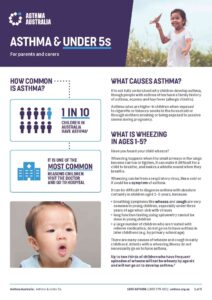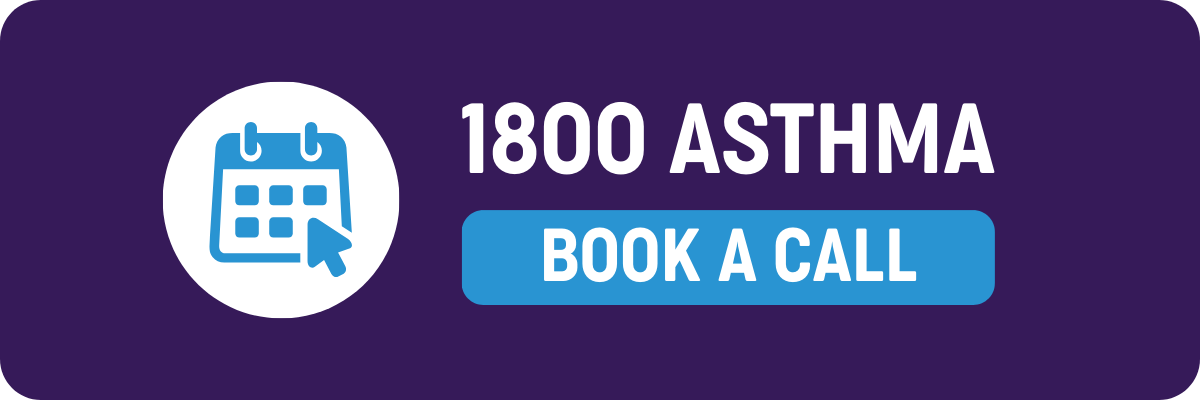Asthma Symptoms in Kids
Asthma symptoms in kids can be harder to spot. Kids have much smaller breathing tubes (airways) than adults. This means even small changes to how their airways work can make a big difference to their breathing.
As kids can’t always tell us their symptoms, we need to rely on all our senses to understand what might be happening. Knowing what symptoms to look for can help you and your doctor decide on the right course of action for your child. Like adults, they may not have all the symptoms, but some things to look out for include:
1. Being breathless or difficulty breathing

Think about how your child breathes when they are well. This makes it easier to look for symptoms when they are unwell. For all kids, especially our younger ones, look for these signs and symptoms of breathing difficulty or being breathless:
- Does your child breathe through their mouth or their nose?
- If they have a virus or a blocked nose from allergies, breathing through their nose is more difficult. When their nose can’t filter, warm or moisten the air they breathe, breathing in air through their mouth may irritate their small breathing tubes.
- Changes in how your child breathes:
- Look at their body while they breathe. Are they breathing faster than usual or are there any sounds made while breathing?
- Are they using their body to help them breathe? For example, raising their shoulder when they take a breath.
- Activity levels:
- Does your child get out of breath while playing or stay out of breath for longer than usual?
- Is your child avoiding activities because they get breathless?
- Are they quieter or more irritable than usual?
- Have they said they have a sore tummy?
More serious signs that your child is struggling to breathe and needs emergency help include:
- the soft area at the bottom of their throat (where it meets the chest) is sucking in and out during breathing
- their tummy is sucking in or pumping up and down
- the muscles between the ribs are sucking in when they take a breath
- their lips are turning blue.
- they are unable to finish their sentences or eat because they are so breathless
Any sign of breathing difficulty should result in a visit to the doctor. These symptoms will help your doctor to understand your child’s condition and decide which treatment will be best for them. It’s important to tell them about all your child’s symptoms, even if you feel like they are normal.
2. Wheezing

A wheeze is a high-pitched whistling sound made by the airways when they are narrowing. It can sometimes be easy to hear, or your doctor may hear it as they listen to your child’s breathing using a stethoscope. A wheeze can be caused by several things, including asthma. However, not all children will have a wheeze with asthma.
A wheeze is more likely to be asthma if it’s:
- very frequent
- worse at night or early in the morning
- happens when your child doesn’t have a cold
- occurs in reaction to a trigger.
Talk to your doctor if your child has a wheeze.
3. Coughing

Coughs in kids can be caused by many things, and there are lots of different types of coughs. Sometimes coughing brings up mucus or phlegm. No matter how the cough sounds, talk to your doctor if your child has:
- an ongoing cough or one that won’t go away
- a cough that only occurs during the night or early morning
- a cough during sport or activity
- a cough when excited or laughing.
4. Chest Tightness

Kids might feel chest tightness when the airways are so narrow it is difficult to get the air in or out. This might make them feel like there is a heavy weight on their chest. Your child might say things like “I’m feeling sick” or “I have a sore tummy”.
If your child or a child you care for is experiencing this symptom it’s important to see a doctor and review their symptoms or seek a diagnosis.
ARE YOU GETTING USED TO ASTHMA SYMPTOMS?
Sometimes, you or your child might have asthma symptoms so often that you get used to these symptoms. It becomes the ‘new normal’ way of being or breathing.
Ignoring or putting up with symptoms can be dangerous because your asthma can become worse more quickly. Without treatment of your symptoms, there may also be long-term damage to your lungs.
If you have trouble with your symptoms, talk with your doctor about how they can help.
Asthma Educators can answer your asthma questions
Book a FREE phone call at a time that works for you or call us direct on 1800ASTHMA (1800 278 462).





 1800 278 462
1800 278 462
